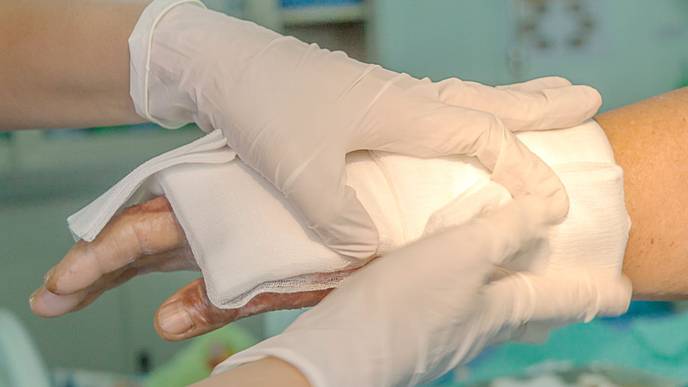Seaweed- and Carbonated Water-Based Hydrogel Shows Promise for Treatment of Skin Wounds

12/22/2023
Results from a new study suggested promise for a new seaweed- and carbonated water-based hydrogel that aims to prevent the temproary dilation of wound sites.
Reserachers developed a low-adhesion, low-swelling hydrogel using alginate, which is non-adhesive to cells and to skin tissue, as well as CaCo3, and carbonated water. In their mouse models, the researchers reported between 11.9- to 16.5-fold reductions in skin adhesion, and a 1.9-fold reduction in swelling with the use of the hydrogel compared to low-adhesion hydrogel wound dressings. According ot the authors, the carbonated water promostes the gelation of polysaccharide/CaCO3 solution to form hydrogels in a short period of time, while the CO2 in the hydrogel is volatized from the hydrogel surface, preventing acidic residues in the hydrogel and allowing for a pH value suitable for wound healing.
“Through animal experiments, we demonstrated that our hydrogel has a high therapeutic effect and at the same time can suppress the temporary expansion of the wound area caused by conventional clinical preparations,” remarks Ryota Teshima, a Master's student at the Tokyo University of Science, and an author on the paper, said in a press release.“This proves our initial hypothesis that gels with low skin adhesion and low-swelling properties are excellent as wound dressing materials, which is the complete opposite of conventional wisdom.”
The authors emphasized that the alginate used in the study can be extraced from beach-stranded seaweed, which is a renewable resource often discarded and regarded as waste material.
“Medical materials still lack a sustainability-oriented perspective, and we believe this research will serve as a benchmark for the design of future medical materials and lead to sustainable and low-cost wound care,” Mr. Teshima said. “Moreover, our findings can help clarify issues with hydrogel formulations currently in clinical use and provide new design guidelines for next-generation wound treatment gels.”

Facebook Comments